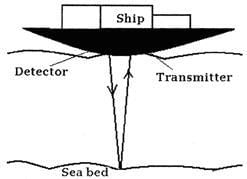Class 9 Exam > Class 9 Tests > Science Class 9 > Test: Production And Propagation Of Sound - Class 9 MCQ
Test: Production And Propagation Of Sound - Class 9 MCQ
Test Description
10 Questions MCQ Test Science Class 9 - Test: Production And Propagation Of Sound
Test: Production And Propagation Of Sound for Class 9 2025 is part of Science Class 9 preparation. The Test: Production And Propagation Of Sound questions and answers have been
prepared according to the Class 9 exam syllabus.The Test: Production And Propagation Of Sound MCQs are made for Class 9 2025 Exam. Find important
definitions, questions, notes, meanings, examples, exercises, MCQs and online tests for Test: Production And Propagation Of Sound below.
Solutions of Test: Production And Propagation Of Sound questions in English are available as part of our Science Class 9 for Class 9 & Test: Production And Propagation Of Sound solutions in
Hindi for Science Class 9 course. Download more important topics, notes, lectures and mock
test series for Class 9 Exam by signing up for free. Attempt Test: Production And Propagation Of Sound | 10 questions in 10 minutes | Mock test for Class 9 preparation | Free important questions MCQ to study Science Class 9 for Class 9 Exam | Download free PDF with solutions
Detailed Solution for Test: Production And Propagation Of Sound - Question 1
Test: Production And Propagation Of Sound - Question 2
You can not talk to each other on the moon because
Detailed Solution for Test: Production And Propagation Of Sound - Question 2
Test: Production And Propagation Of Sound - Question 3
The motion of the particles of a medium when a sound wave is passing through it is:
Detailed Solution for Test: Production And Propagation Of Sound - Question 3
Test: Production And Propagation Of Sound - Question 4
Which of the following quantities is transferred during wave propagation?
Detailed Solution for Test: Production And Propagation Of Sound - Question 4
Detailed Solution for Test: Production And Propagation Of Sound - Question 5
Detailed Solution for Test: Production And Propagation Of Sound - Question 6
Test: Production And Propagation Of Sound - Question 7
In longitudinal waves, how does the particle of medium vibrate compared to the direction of propagation of wave?
Detailed Solution for Test: Production And Propagation Of Sound - Question 7
Test: Production And Propagation Of Sound - Question 8
Which of the following will does not allow sound propagation?
Detailed Solution for Test: Production And Propagation Of Sound - Question 8
Test: Production And Propagation Of Sound - Question 9
Which of the following is a mechanical wave?
Detailed Solution for Test: Production And Propagation Of Sound - Question 9
Test: Production And Propagation Of Sound - Question 10
The method of detecting the presence, position and direction of motion of distant objects by reflecting a beam of sound waves is known as _____.
Detailed Solution for Test: Production And Propagation Of Sound - Question 10
|
84 videos|544 docs|60 tests
|
Information about Test: Production And Propagation Of Sound Page
In this test you can find the Exam questions for Test: Production And Propagation Of Sound solved & explained in the simplest way possible.
Besides giving Questions and answers for Test: Production And Propagation Of Sound, EduRev gives you an ample number of Online tests for practice















